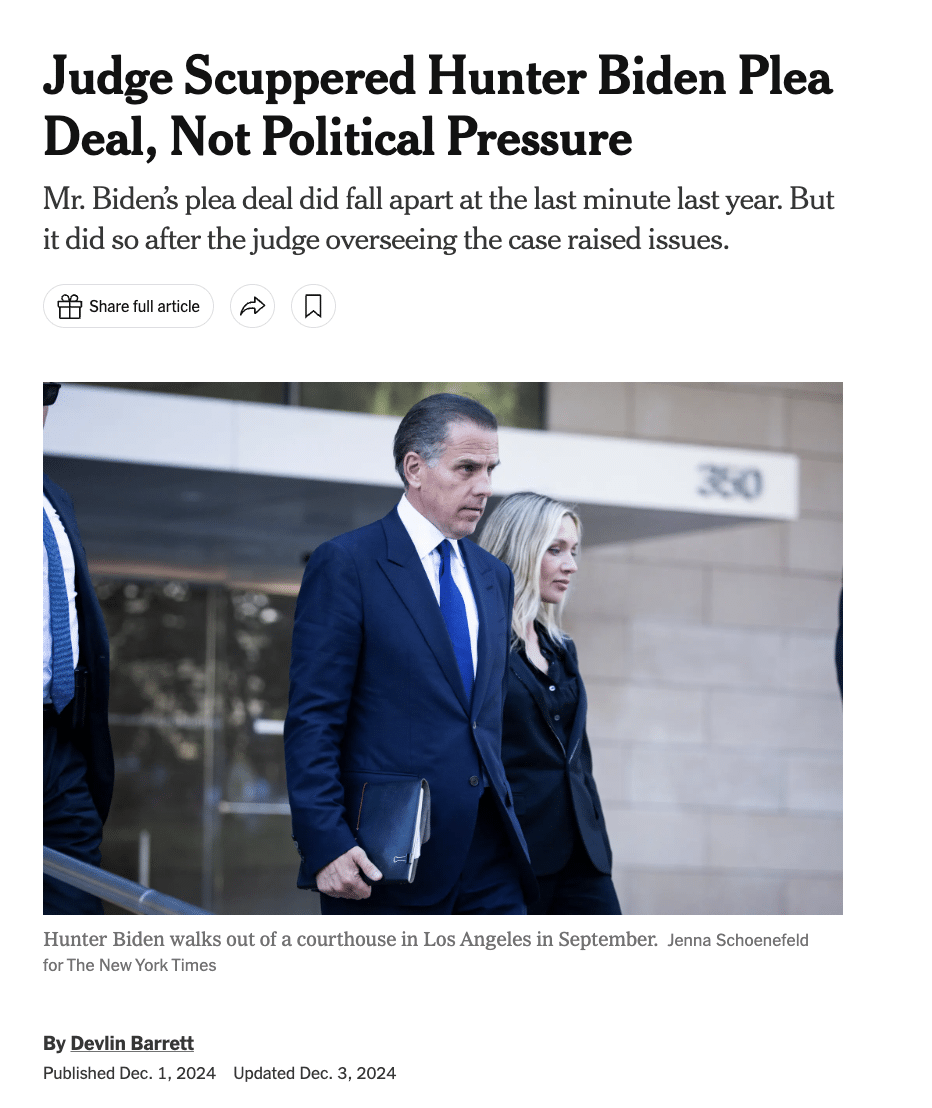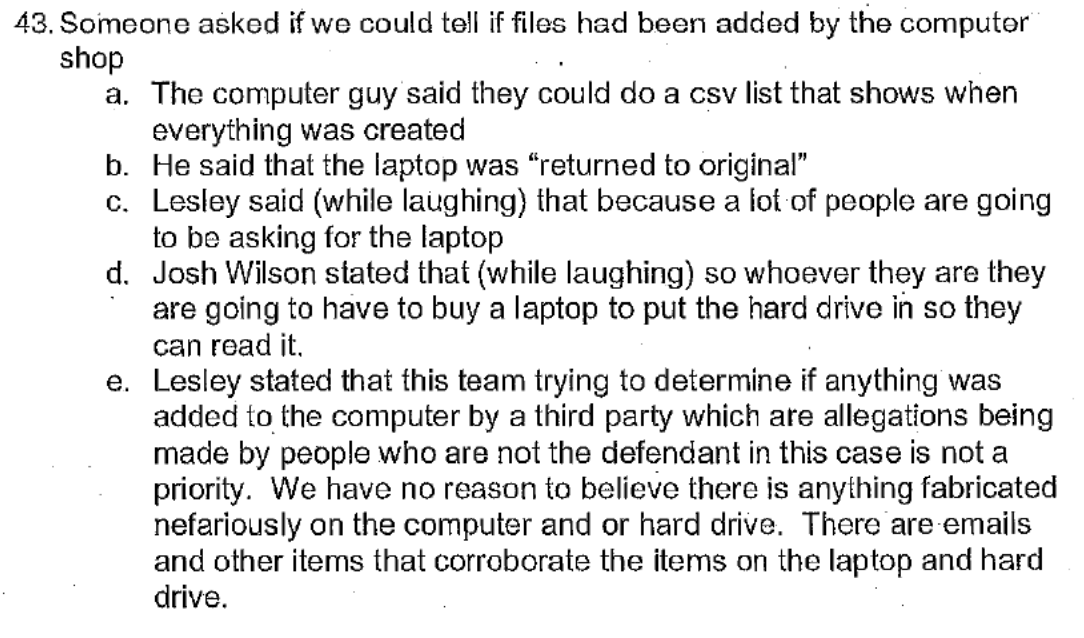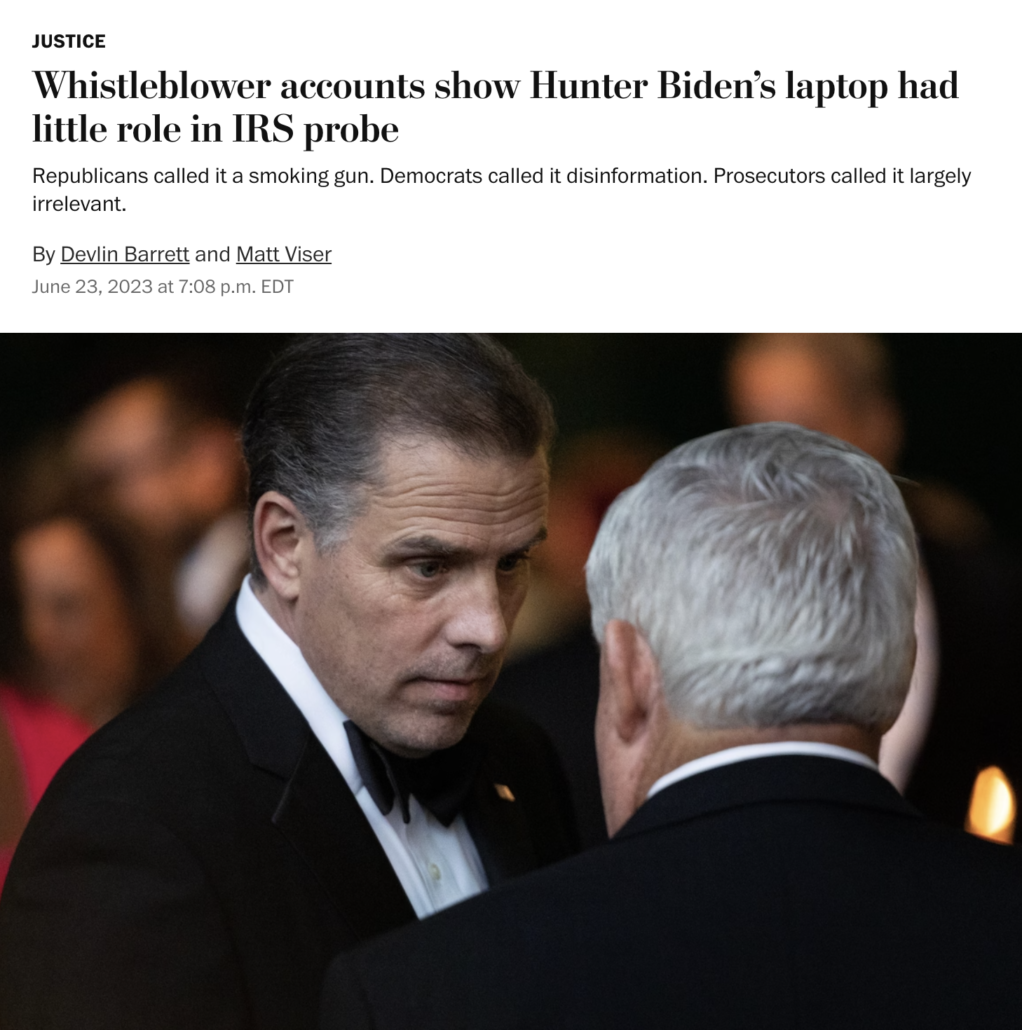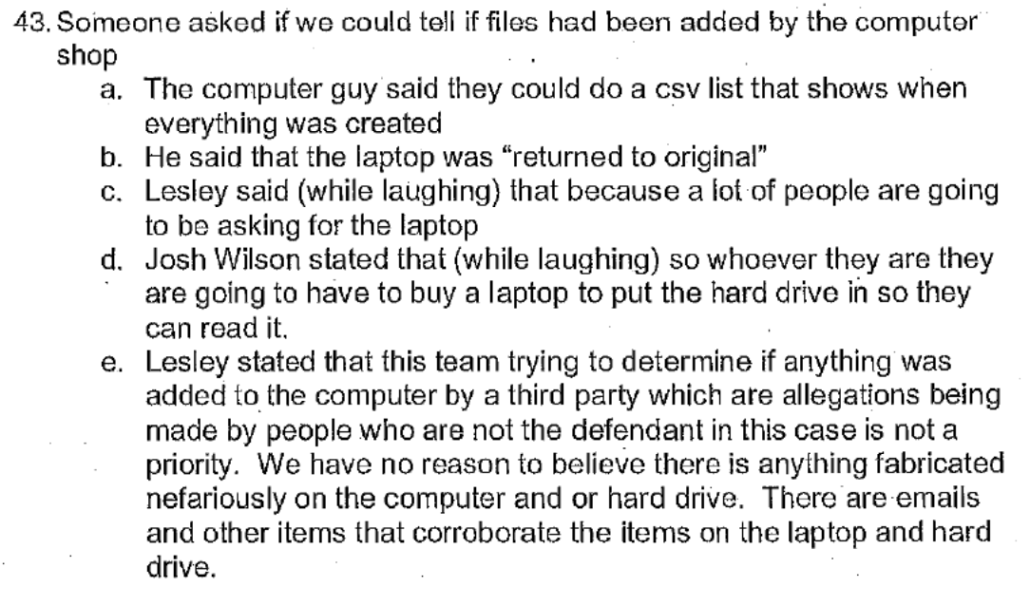Those who didn’t follow John Durham’s trials closely undoubtedly missed the parade of scarred FBI personnel whose post-Crossfire Hurricane vulnerability Durham attempted to exploit to support his invented claims of a Clinton conspiracy.
Sure, lots of people wrote about Jim Baker’s inability to provide credible answers about the meeting he had with Michael Sussmann in September 2016. Fewer wrote about the credible case that Sussmann’s attorneys made that a prior Durham-led investigation into Baker — for sharing arguably classified information with a reporter in an attempt to forestall publication of a story — made Baker especially quick to cooperate with Durham in 2020. Fewer wrote about Baker’s description of the stress of Jim Jordan’s congressional witch hunts.
It sucked because the experience itself, sitting in the room being questioned the way that I was questioned, was, as a citizen of the United States, upsetting and appalling, to see members of Congress behaving the way that they were behaving. It was very upsetting to me.
[snip]
It sucked because my friends had been pilloried in public, my friends and colleagues had been pilloried in public, improperly in my view; that we were accused of being traitors and coup plotters. All of this was totally false and wrong.
Such a circus was the kind of thing that might lead someone like Baker to prefer the “order” of a prosecutor chasing conspiracy theories, someone whose memory was seared by the firing of Jim Comey.
[Sean Berkowitz]. And this is a pretty terrible experience as well. Right?
A. It’s more orderly.
Q. (Gestured with hand to ear.)
A. This is more orderly. It’s terrible but orderly.
Q. And you’re doing the best you can. Right, sir?
A. Yes, sir.
Q. But it’s hard to remember events from a long time ago, 1snre sez
A. It depends on what the event is. I remember Jim Comey being fired, for example. That’s a long time ago and I have a clear recollection of that. So it depends on what you’re talking about.
But Baker wasn’t the only one who discussed the years of scrutiny. Counterintelligence Special Agent Ryan Gaynor, who worked in DC on the Russian investigations during 2016, described how in October 2020, after he revealed to Durham’s team that he knew a DNC lawyer had brought in the Alfa Bank tip, Durham’s team told him they were no longer treating him as a witness, but as a subject of the investigation.
A. Yeah. There were two thoughts. The first one was that I felt like I had woefully ill prepared for the meeting, because I didn’t know what the meeting was honestly going to be about with this investigation.
The second thought was that I was in significant peril, and it was very concerning as a DOJ employee to be told that now the Department of Justice is interested in looking at you as a subject instead of a witness.
Sussmann lawyer Michael Bosworth got Gaynor to explain that after he told a story more to Durham’s liking, he was moved back to the status of witness.
During his testimony, Curtis Heide (who played a key role in the George Papadopoulos investigation) explained how the FBI Inspection Division investigation into Crossfire Hurricane Agents, including him, remained pending, 6 years after the events in question. He noted that, three years after the DOJ IG Report, he was still being investigated even though he, “didn’t author any of the affidavits or any of the materials related to the applications in question.”
The same was true in the Danchenko case. Brian Auten, a key intelligence analyst on Crossfire Hurricane, described how, after having met with agents from DOJ IG four times, having done a long report for FBI’s Internal Affairs Division, and having met with the Senate Judiciary Committee — all with no concerns raised about his own conduct — the first time he met with Durham’s team, he was told he was a subject of the investigation. After Auten gave testimony that confirmed Danchenko’s reliability — seriously damaging his case — Durham himself raised investigations that undermined his own witness’ testimony.
Q. Do you recall that there was a reporter that the OIG had written concerning the Carter Page FISAs?
A. Yes.
Q. And how would you characterize that report?
A. The report was quite extensive and it discussed characterizing a number of errors and omissions.
Q. And with respect to the errors and omissions, were they tick-tacky kinds of omissions or were they significant omissions and errors that had been committed?
A. I believe the OIG described them as significant.
Q. And then with respect to the investigation done by the OIG, separate and apart from that, would it be a fair statement that you and your colleagues were under investigation by the inspection division by the FBI?
A. Yes.
Q. And would it be a fair statement that your conduct in connection with that is, you, yourself, based on the investigation done by the inspection division of the FBI, have some issues, correct?
A. I — be a little bit more specific. I’m sorry. I don’t — I have issues?
Q. Isn’t it, in fact, true that you’ve been recommended for suspension as the result of the conduct?
A. It is currently under appeal.
That line of testimony immediately preceded a hilarious failed attempt from Durham to get Auten to agree that George Papadopoulos was simply a young man with no contact to Trump who was only investigated for his suspect Israeli ties, not for his Russian ties. But it was a palpable example of the way that Trump’s minions used criminalizing FBI investigations into Trump as a way to create a makebelieve world that negates real evidence of Trump’s corruption.
About the only two FBI agents who weren’t portrayed as somehow tainted by the events of 2016 in Durham’s two failed prosecutions were two agents who fucked up investigations: Scott Hellman, who correctly told a junior agent that she would face zero repercussions of she botched the Alfa Bank investigation, and Ryan James, an FBI agent who started his career in Connecticut, who nevertheless failed to pull the evidence necessary to test Sergei Millian’s claims.
Durham rewarded the incompetence that served his purpose and attempted to criminalize what he considered the wrong answers or at least to use the threat of adverse consequences to invent a false record exonerating Trump.
And Durham came in after Jim Comey, Peter Strzok, Andrew McCabe, and Bruce Ohr had already been fired, and Lisa Page, with Strzok, deliberately humiliated on a global stage serially. He came in and exploited the uncertain status — the Inspection Division review left pending while Durham worked — of everyone involved. Such efforts didn’t end with the conclusive acquittals debunking Durham’s theories of conspiracy. Since then, Jim Baker has been dragged back through the mud — publicly and in Congress — as part of Twitter Files, Chuck Grassley passed on “whistleblower” complaints about Auten identifying Russian disinformation as such, and Timothy Thibault was publicly berated because some of the same so-called whistleblowers feeding Jim Jordan shit had complained to Chuck Grassley he was discouraging GOP conspiracy theories about Hunter Biden.
It was never just Strzok and McCabe. The entire Republican Party has relentlessly focused on punishing anyone involved in the Trump investigation, using both unofficial and official channels. When Trump promised “retribution” the other day at CPAC, this kind of relentless effort to criminalize any check on Trump’s behavior is what he was talking about.
That kind of background really helps to understand the WaPo story that described Washington Field Office FBI agents quaking at the prospect of searching Donald Trump’s beach resort.
[P]rosecutors learned FBI agents were still loath to conduct a surprise search. They also heard from top FBIofficials that some agents were simply afraid: They worried takingaggressive steps investigatingTrump could blemish or even end their careers, according to somepeople with knowledge of the discussions. One official dubbed it “the hangover of Crossfire Hurricane,” a reference to the FBI investigation of Russia’s interference in the 2016 presidential election and possible connections to the Trump campaign, the people said. As president, Trump repeatedly targeted some FBI officials involved in the Russiacase.
[snip]
FBI agents on the case worried the prosecutors were being overly aggressive. They found it worrisome, too, that Bratt did not seem to think it mattered whether Trump was the official subject of the probe. They feared any of these features might not stand up to scrutiny if an inspector general or congressional committee chose to retrace the investigators’ steps, according to the people.
Since I wrote my piece wondering whether the FBI hesitation gave Trump the chance to steal 47 documents, Strzok himself, Joyce Vance, and Jennifer Rubin have weighed in.
Rubin, I think, adopts the position of someone who hasn’t followed the plight of all the people not named Strzok who were targeted for investigating Donald Trump. She attributes the reluctance to investigate Trump (and the intelligence failures leading up to January 6, which I’ll return to) to Wray.
After a debacle of this magnitude, that sort of passivity should alarm all Americans. Imagine if, after the terrorist attacks of Sept. 11, 2001, the national security community did not evaluate how it missed the telltale signs of an imminent attack. The failure of leadership in the Jan. 6 case is inexcusable. Yet Wray has never been held to account for this delinquency.
[snip]
[O]ne is left wondering why the FBI seems disinclined to stand up to right-wing authoritarian movements and figures. Whatever the reason, the pattern reveals an unmistakable lack of effective leadership. And that in turn raises the question:Why is Wray still there?
It is absolutely the case that Wray did far too little to protect FBI agents in the face of Trump’s attacks. Wray created the opportunity for pro-Trump FBI agents and Durham to criminalize investigating Trump. I think Wray attempted to avoid rocking the boat at all times, which led the FBI to fail in other areas (including the investigation of Brett Kavanaugh). Though I’m also cognizant that if Wray had been fired during the Trump administration, he might have been replaced by someone like Kash Patel, and having a Trump appointee in charge right now may provide cover for the ongoing investigations into Trump.
But you could fire Wray tomorrow and not eliminate the effects of this bureaucratic discipline, the five year process to teach everyone in the FBI that investigating Trump can only lead to career disaster, if not criminal charges.
Also under Wray, though, the Bureau had already increased its focus on domestic terrorism, with key successes both before and after January 6. Steven D’Antuono, the chief voice of reluctance to search Mar-a-Lago, presided over the really troubled but ultimately successful effort to prevent a kidnapping attempt targeting Gretchen Whitmer, a plot that arose out of anti-lockdown protests stoked by Trump (though unusually, D’Antuono let a subordinate take credit for the arrests).
I think the specific failures in advance of January 6 lay elsewhere. Wray has not done enough in the aftermath to understand the FBI’s failures, but FBI has also been overwhelmed with the case load created by the attack. But, as I hope to return to, I think the specific failure in advance of January 6 lies elsewhere.
Whatever the merit in blaming Wray for FBI’s failure to prepare for January 6, there’s a bigger problem with Rubin’s attempt to blame him on the MAL search. Strzok sketched out in great detail something I had seen, too. The dispute about searching Trump’s house wasn’t between the FBI and DOJ. It wasn’t just what Vance and Strzok both describe as a fairly normal dispute between the FBI and DOJ with the former pushing the latter to be more aggressive.
It was between the WFO on one side and DOJ and FBI HQ on the other.
[A] careful reading of the Post’s reporting (insofar as the reporting is complete) reveals this was not so much a conflict between DOJ and the FBI as much as a conflict between DOJ and FBI headquarters, on the one hand, and the management of the FBI’s Washington Field Office, on the other.
Indeed, a key part of the drama surrounding the pre-August search meeting described by the WaPo involved the conflict between FBI General Counsel Jason Jones — whom WaPo makes a point of IDing as a Wray confidant, thereby marking him as Wray’s surrogate in this fight — and WFO Assistant Director Steven D’Antuono.
Jason Jones, the FBI’s general counsel who isconsidered a confidant of FBI Director Christopher A.Wray, agreed the team had sufficient probable cause to justify a searchwarrant.
[snip]
Jones, the FBI’s general counsel, said he planned to recommend to Deputy FBI Director Paul Abbate that the FBI seek a warrant for the search, the people said. D’Antuono replied that he would recommend that they not.
This, then, was partly a fight within FBI, one in which Wray’s surrogate sided with prosecutors.
Strzok makes a compelling argument that this story may have come from pushback necessitated by people at WFO floating bullshit claims, not dissimilar from — Strzok doesn’t say this, but I will — the leak by right wing agents to Devlin Barrett about the Clinton Foundation investigation in advance of the 2016 election, which led Andrew McCabe to respond in a way that ultimately gave Trump the excuse he wanted to fire him.
Indeed, Strzok’s post includes a well-deserved dig on the WaPo’s claim about, “the fact that mistakes in prior probes of Hillary Clinton … had proved damaging to the FBI,” an unsubstantiated claim I also called out.
[E]ven journalists can be imprecise or inaccurate. The Post’s article isn’t, for example, the type of comprehensive accounting you’d get in a report produced by an Inspector General, who can compile the statements of everyone involved and review and compare those statements to the written record in all its various forms.
Strzok right suggests that DOJ IG’s Report disproved WaPo’s claim about the Hillary investigation, but he seems to have forgotten that the DOJ IG Report into McCabe’s response on the Clinton Foundation didn’t fully air the FBI spox’s exculpatory testimony.
All of which is to say that, in the same way that WFO agents have an understandable visceral concern about getting involved in an investigation targeting Trump, people at HQ might have an equally visceral concern about stories seeded to Devlin Barrett alleging internal conflict that might create some flimsy excuse for firing.
But there’s something still unexplained about the WaPo story. Vance notes, as I did, that D’Antuono may have given Trump the opportunity to steal 47 documents.
[T]he delay couldn’t be undone. We still don’t know whether that resulted in the permanent loss of classified material. It did result in a delay in the timeline for making prosecutive decisions, ultimately extending the investigation into the period where Trump announced his 2024 candidacy, leading to the appointment of a special counsel to continue the investigation and determine whether to prosecute.
But Vance still accepts WaPo’s specious claim about timing, the claim that the delay (from June to August) in searching Trump’s resort led the investigation to bump up against a Trump campaign announcement that would surely have happened earlier had Trump not gotten an injunction. There’s nothing to support that temporal argument, and the public record on the injunction (which, again, lasted until almost a month after Jack Smith’s appointment) disproves it.
The timing issue is one of many reasons why I keep thinking about this earlier Devlin Barrett story, one that did bump up against the appointment of a Special Counsel. On November 14, the day before Trump formalized his 2024 run and so four days before the appointment of Jack Smith, Barrett and WaPo’s Mar-a-Lago Trump whisperer, Josh Dawsey, published a story suggesting that maybe Trump shouldn’t be charged because he just stole a bunch of highly classified documents to keep as trophies.
Federal agents and prosecutors have come to believe former president Donald Trump’s motive for allegedly taking and keeping classified documents was largely his ego and a desire to hold on to the materials as trophies or mementos, according to people familiar with the matter.
As part of the investigation, federal authorities reviewed the classified documents that were recovered from Trump’s Mar-a-Lago home and private club, looking to see if the types of information contained in them pointed to any kind of pattern or similarities, according to these people, who spoke on the condition of anonymity to discuss an ongoing investigation.
That review has not found any apparent business advantage to the types of classified information in Trump’s possession, these people said. FBI interviews with witnesses so far, they said, also do not point to any nefarious effort by Trump to leverage, sell or use the government secrets. Instead, the former president seemed motivated by a more basic desire not to give up what he believed was his property, these people said.
[snip]
The analysis of Trump’s likely motive in allegedly keeping the documents is not, strictly speaking, an element of determining whether he or anyone around him committed a crime or should be charged with one. Justice Department policy dictates that prosecutors file criminal charges in cases in which they believe a crime was committed and the evidence is strong enough to lead to a conviction that will hold up on appeal. But as a practical matter, motive is an important part of how prosecutors assess cases and decide whether to file criminal charges.
As I showed, that story, like this one, simply ignored stuff in the public record, including:
- Trump’s efforts, orchestrated in part by investigation witness Kash Patel, to release documents about the Russian investigation specifically to serve a political objective
- The report, from multiple outlets, that Jay Bratt told Trump’s lawyers that DOJ believes Trump still has classified documents
- Details about classified documents interspersed with a Roger Stone grant of clemency and messages — dated after Trump left the White House — from a pollster, a book author, and a religious leader; both sets of interspersed classified documents were found in Trump’s office
- The way Trump’s legal exposure would expand if people like Boris Epshteyn conspired to help him hoard the documents or others like Molly Michael accessed the classified records
Since then, other details have become clear. Not only was that story written after DOJ told Trump they believed he still had some classified documents, but it was written in the period between the time Trump considered letting the FBI do a consensual search and the time he hired people to do the search for him, a debate inside the Trump camp that parallels the earlier investigative fight between WFO and DOJ. Indeed, when DOJ alerted Trump’s lawyers in October that they believed Trump still had classified documents, that may have reflected WFO winning the debate they had lost before the August search: to let Trump voluntarily comply.
That’s important background to where we are now. Trump’s team has misrepresented to the press how cooperative they have been since. First, Trump’s people misleadingly claimed that Beryl Howell had decided not to hold Trump in contempt (rather than just deferred the decision) and Trump lied to the press for several months, hiding the box with documents marked classified and the additional empty classified folder. Those public lies should only make investigators wonder what Trump continues to hide.
We know Trump blew off the subpoena that WFO agents were sure would work in June, and there’s good reason to believe DOJ finds Trump’s more recent claims of cooperation to be suspect as well.
So let’s go back to that earlier Devlin story. As I noted at the time, I don’t dispute that the most classified documents have the appearance of trophies, but that’s because of the Time Magazine covers they were stored with, not because of any halfway serious scrutiny of Trump’s potential financial goals. Particularly given the presence of 43 empty classified folders in the leatherbound box along with the most sensitive documents, no thorough investigator could rule out Trump already monetizing certain documents, particularly given Trump and Jared Kushner’s financial windfalls from the Saudi government, particularly given the way that Trump’s Bedminster departure coincided with Evan Corcoran’s turnover of classified documents, particularly given that the woman who carted a box including some marked classified around various offices had been in Bedminster with Trump during the summer. I don’t dispute that’s still a likely explanation for some — but in no way all — of the documents, but no competent investigator could have made that conclusion by November 14, when Devlin published the story.
Unless Devlin’s sources — perhaps the same or similar to the sources who know that WFO agents were cowed by the treatment of Crossfire Hurricane agents — were working hard to avoid investigating those potential financial ties.
Unless the timing of the story reflected an attempt to win that dispute, only to be preempted by the appointment of Jack Smith. The earlier dispute could not have been impacted by the appointment of Jack Smith. If there was a later dispute about how to make sure Trump wasn’t still hoarding classified documents, though, it almost certainly was.
Someone decided to leak a story to Devlin Barrett suggesting that investigators had already reached a conclusion about Trump’s motive, even though as the story acknowledged, “even the nonclassified documents” — better described as documents without classification marks that not only hadn’t been reviewed yet, which could have included unmarked classified information — “taken in the search may include relevant evidence.” (Note, these are the same unclassified documents that, the recent story describes D’Antuono, insanely from an investigative standpoint, scoffing at collecting because, “We are not the presidential records police.”) Devlin’s sources decided to leak that story at a time when DOJ was trying to figure out how to get the remaining documents from Trump, and yet his sources presented a working conclusion that it didn’t matter if DOJ got the remaining documents: it had already been decided, Devlin’s sources told him, that Trump was just a narcissist fighting to keep his trophies from time as President and probably that shouldn’t be prosecuted anyway.
The story of the earlier dispute is alarming because it confirms that WFO agents remain cowed in the face of the prospect of investigating Trump, as some did even six years ago. The later story, though, is alarming because leaks to Devlin have a habit of creating political firestorms that are convenient for Trump. But it is alarming because it suggests even after the August search proved the WFO agents’ efforts to draw premature conclusions wrong, someone still decided to make — and force, by leaking to Devlin Barrett — some premature conclusions in November, an effort that genuinely was thwarted by the appointment of Jack Smith.









